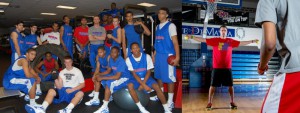Podcast: Play in new window | Download
Subscribe: Apple Podcasts | RSS | More
Why You Should Listen?
November 22, 1991, Derek Kellogg comes to UMASS as an unheralded point guard. The media was bagging on coach Calipari, because they strongly believed that he should not have spent state money on Derek’s scholarship. Under coach Cal’s leadership, Derek was able to prove them wrong by becoming a three year starter, leading them to three straight NCAA Tournaments and a Final 8 finish. Coach Derek Kellogg has had the great opportunity to be mentored by coach Cal as a player and coach.
On April 23, 2008, UMASS brought one of its own home to lead the men’s basketball program. The energetic and hard-working coach Kellogg has been able to take what he has learned, from coach Cal, and bring UMASS basketball back to national prominence, with three consecutive 20 win seasons, three consecutive postseason tournaments and a top 20 national ranking.
Listen to this episode of the Jim Huber Show to hear what key ingredients that coach Calipari used in taking UMASS men’s basketball to one of the worst division I programs to playing for National Championships, what coach Cal taught Derek to turn him into high level point guard, lessons coach Kellogg learned from coach Cal that he implements on a daily basis for success, etc. There is so much beneficial information for coaches, parents and players that coach discusses throughout the show!
Enjoy this episode of The Jim Huber Show!
What You will Hear In This Podcast
- 2:14- Introduction of coach Derek Kellogg
- 2:41- John Chaney and John Calipari 1994 Confrontation
- 4:27- How to play fast and still get players to take good shots?
- 5:49- Is the mid-range jumper a good or bad shot?
- 6:52- The motivation of the “Gladiator” movie to name Derek’s son
- 8:25- KU vs Memphis National Championship Game
- 9:11- What is the “IT” factor of a Point Guard?
- 10:31- Who is the best PG in the NBA for players to model?
- 11:15- Importance of a player going to the right college for their development
- 11:55- UMASS great facilities and top recruiting classes
- 12:53- How coach Calipari transformed UMASS into a national power
- 14:21- Memory of playing in the legendary “Cage”
- 16:34- Lessons learned from coach Calipari to become a great PG
- 18:24- The Trifecta with coach Derek Kellogg
- Movie: “Gladiator”
- Book: Bounce Back by John Calipari
- Best Piece of Advice: “Dream Big and Believe That Anything Is Possible”
Follow on Twitter at: @CoachKellogg and @UMassBasketball
Find Information on UMASS Men’s Basketball Website
I’d love to know your thoughts after you check out the interview. What resonated? What did you learn?
Hit me up @jimhubershow or email me at thejimhubershow@gmail.com
Remember: “Let’s Make The World Better Through Sports”
